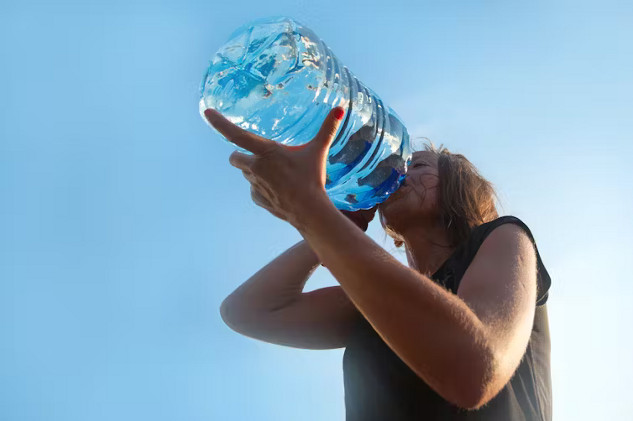 In late 2023, actor Brooke Shields suffered a seizure after “flooding” her body with water. Shields became dangerously low on sodium while preparing for her show by drinking loads of water. “I flooded my system and I drowned myself,” she would later explain. “And if you don’t have enough sodium in your blood or urine or your body, you can have a seizure.”
In late 2023, actor Brooke Shields suffered a seizure after “flooding” her body with water. Shields became dangerously low on sodium while preparing for her show by drinking loads of water. “I flooded my system and I drowned myself,” she would later explain. “And if you don’t have enough sodium in your blood or urine or your body, you can have a seizure.”
Shields said she found herself walking around outside for “no reason at all”, wondering: “Why am I out here?”
Then I walk into the restaurant and go to the sommelier who had just taken an hour to watch my run through. That’s when everything went black. Then my hands drop to my side and I go headfirst into the wall.
Shields added that she was “frothing at the mouth, totally blue, trying to swallow my tongue”.
Like Shields, many people may be unaware of the dangers of drinking excessive amounts of water – especially because hydration is so often associated with health benefits. Models and celebrities often advocate drinking lots of water to help maintain clear, smooth skin. Some social media influencers have promoted drinking a gallon of water daily for weight loss.
But excessive water consumption can cause hyponatraemia – a potentially fatal condition of low sodium in the blood.
Worried about hydration levels? Check your urine
The body strictly regulates its water content to maintain the optimum level of total body water and “osmolality” – the concentration of dissolved particles in your blood. Osmolality increases when you are dehydrated and decreases when you have too much fluid in your blood.
Osmolality is monitored by osmoreceptors that regulate sodium and water balance in the hypothalamus – the part of the brain that controls numerous hormones. These osmoreceptors signal the release of antidiuretic hormone (ADH), which acts on blood vessels and the kidneys to control the amount of water and salt in the body.
In healthy people, the body releases ADH when osmolality becomes high. ADH tells the kidneys to reabsorb water, which makes urine more concentrated. The reabsorbed water dilutes the blood, bringing osmolality back to normal levels.
Low blood osmolality suppresses the release of ADH, reducing how much water the kidneys reabsorb. This dilutes your urine, which the body then passes to rid itself of the excess water.
Healthy urine should be clear and odourless. Darker, yellower urine with a noticeable odour can indicate dehydration – although medications and certain foods, including asparagus, can affect urine colour and odour, too.
How much is too much?
Adults should consume two-to-three litres per day, of which around 20% comes from food. However, we can lose up to ten litres of water through perspiration – so sweating during exercise or in hot weather increases the amount of water we need to replace through drinking.
Some medical conditions can cause overhydration. Approximately one in five schizophrenia patients drink water compulsively, a dangerous condition known as psychogenic polydipsia. One long-term study found that patients with psychogenic polydipsia have a “74% greater chance of dying before a non-polydipsic patient”.
In some cases, people with anorexia nervosa can also suffer from compulsive water drinking.
For those suffering from polydipsia, treatment is focused on medication to reduce the urge to drink, as well as increasing sodium levels. This should be done gradually to avoid causing myelinolysis – neurological damage caused by rapid changes in sodium levels in nerve cells.
In rare but often highly publicised cases such as that of Leah Betts in 1995, some users of the illegal drug MDMA (also known as ecstasy) have died after drinking copious amounts of water to rehydrate after dancing and sweating.
The drug increases body temperature, so users drink water to avoid overheating. Unfortunately, MDMA also triggers the unnecessary release of ADH, causing water retention. The body becomes unable to rid itself of excess water, which affects its electrolyte levels – causing cells to swell with water.
Symptoms of water intoxication start with nausea, vomiting, blurred vision and dizziness. As the condition progresses, sufferers can often display symptoms of psychosis, such as inappropriate behaviour, confusion, delusions, disorientation and hallucinations.
These symptoms are caused by hyponatraemia, where sodium levels are diluted or depleted in blood and the subsequent imbalance of electrolytes affects the nervous system. Water begins to move into the brain causing a cerebral oedema – brain swelling because of excessive fluid buildup, which is usually fatal if not treated.
A healthy body will tell you when it needs water. If you’re thirsty and your urine is dark with a noticeable odour, then you need to drink more. If you aren’t thirsty and your urine is clear or the colour of light straw, then you’re already doing a good job of hydrating yourself.![]()
Adam Taylor, Professor and Director of the Clinical Anatomy Learning Centre, Lancaster University
This article is republished from The Conversation under a Creative Commons license. Read the original article.
Related Books:
The Body Keeps the Score: Brain Mind and Body in the Healing of Trauma
by Bessel van der Kolk
This book explores the connections between trauma and physical and mental health, offering insights and strategies for healing and recovery.
Click for more info or to order
Breath: The New Science of a Lost Art
by James Nestor
This book explores the science and practice of breathing, offering insights and techniques for improving physical and mental health.
Click for more info or to order
The Plant Paradox: The Hidden Dangers in "Healthy" Foods That Cause Disease and Weight Gain
by Steven R. Gundry
This book explores the links between diet, health, and disease, offering insights and strategies for improving overall health and wellness.
Click for more info or to order
The Immunity Code: The New Paradigm for Real Health and Radical Anti-Aging
by Joel Greene
This book offers a new perspective on health and immunity, drawing on principles of epigenetics and offering insights and strategies for optimizing health and aging.
Click for more info or to order
The Complete Guide to Fasting: Heal Your Body Through Intermittent, Alternate-Day, and Extended Fasting
by Dr. Jason Fung and Jimmy Moore
This book explores the science and practice of fasting offering insights and strategies for improving overall health and wellness.





























